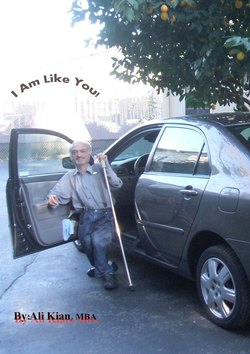Читать книгу I Am Like You! - Ali PhD Kian - Страница 8
На сайте Литреса книга снята с продажи.
Not All Bad:
ОглавлениеWhat may surprise a great many people is the fact that, though my childhood may not have been idyllic, it was much more normal than one might imagine, especially the summers my family spent in Asekan. I have wonderful memories of playing with my cousins and other friends in Dad’s home village. It was a relief for the family to escape the smog and heat of Tehran. Even in the summertime, Asekan was blessed with crisp, cool weather. It was perfect weather for playing in the dirt. Like any other small boy I relished playing soccer with my friends and, to the consternation of my mother, I would often arrive home caked in mud and dirt. There were days, however, when I became so exhausted from play that my body betrayed me and (on those days) it might be necessary for someone to carry me home. A dear aunt of mine recently reminded me of a time when she wandered through the dirt alleys of Asekan looking for me as the sun went down. By the time my aunt found me in an alley, I was too weak to move. No matter, my aunt hoisted me onto her back and carried me home. The next day, just like any other child, I was up at the crack of dawn and ready for the adventures of a new day.
Of course, a hard day of play requires fuel and I vividly recall the cornucopia of delicacies and treats of my childhood. Breakfast might include hot milk from our only cow, fresh eggs laid the night before, butter, feta cheese, and fresh homemade bread. To this day, if I close my eyes and inhale deeply, I can still recall the aroma of fresh bread wafting through the doorways of every house in my village. Baking bread in Asekan felt like a ritual of sorts and there wasn’t a child in the village who couldn’t be lured back home by the promise of a piece of Mother or Grandmother’s bread. Sadly, the village of my childhood seems to have disappeared. Asekan still exists, but the chickens, cows that populated the village are almost all gone, and the art of fresh bread making is now a relic from another time.
The end of summer in Asekan was always bittersweet. The yellowish leaves of Aspen trees were breathtakingly beautiful. The cold morning breezes were invigorating. The dense fog that oftentimes blanketed the village muffled the sounds of the cows and chickens and made an extra hour or two of sleep almost mandatory. Unfortunately, summer’s end meant saying goodbye to friends and a return to Tehran.
Our return trip to Tehran was almost never made alone. Other families often joined us in our trek. Horses and mules would be rented from neighboring villages and a caravan of families would load their belongings on carts and the journey back to Tehran would begin–usually on the last day of summer. Only a few families would stay in Asekan through the winter. Sometimes we were fortunate enough to be visited in Tehran by an aunt, an uncle, and a cousin or two. And our guests never came empty handed. As soon as friends or family arrived, we were plied with an assortment of goodies–feta cheese, fresh butter and, of course, the beloved bread of my village. If we were really lucky, someone would remember to bring a jar of honey made from the wild flowers that dotted the mountains surrounding Gateh Deh–honey that acted as both a treat and a medicine.
